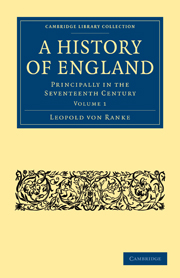Book contents
- Frontmatter
- PREFACE
- TRANSLATORS' PREFACE
- Contents
- BOOK I THE CHIEF CRISES IN THE EARLIER HISTORY OF ENGLAND
- BOOK II ATTEMPTS TO CONSOLIDATE THE KINGDOM INDEPENDENTLY IN ITS TEMPORAL AND SPIRITUAL RELATIONS
- BOOK III QUEEN ELIZABETH. CLOSE CONNEXION OF ENGLISH AND SCOTTISH AFFAIRS
- BOOK IV FOUNDATION OF THE KINGDOM OF GREAT BRITAIN. FIRST DISTURBANCES UNDER THE STUARTS
- BOOK V DISPUTES WITH PARLIAMENT DURING THE LATER YEARS OF THE REIGN OF JAMES I AND THE EARLIER YEARS OF THE REIGN OF CHARLES I
- INTRODUCTION
- CHAP. I James I and his administration of domestic government
- CHAP. II Complications arising out of the affairs of the Palatinate
- CHAP. III Parliament of the year 1621
- CHAP. IV Negotiations for the marriage of the Prince of Wales with a Spanish Infanta
- CHAP. V The Parliament of 1624. Alliance with France
- CHAP. VI Beginning of the reign of Charles I, and his First and Second Parliament
- CHAP. VII The course of foreign policy from 1625 to 1627
- CHAP. VIII Parliament of 1628. Petition of Right
CHAP. VIII - Parliament of 1628. Petition of Right
Published online by Cambridge University Press: 07 June 2011
- Frontmatter
- PREFACE
- TRANSLATORS' PREFACE
- Contents
- BOOK I THE CHIEF CRISES IN THE EARLIER HISTORY OF ENGLAND
- BOOK II ATTEMPTS TO CONSOLIDATE THE KINGDOM INDEPENDENTLY IN ITS TEMPORAL AND SPIRITUAL RELATIONS
- BOOK III QUEEN ELIZABETH. CLOSE CONNEXION OF ENGLISH AND SCOTTISH AFFAIRS
- BOOK IV FOUNDATION OF THE KINGDOM OF GREAT BRITAIN. FIRST DISTURBANCES UNDER THE STUARTS
- BOOK V DISPUTES WITH PARLIAMENT DURING THE LATER YEARS OF THE REIGN OF JAMES I AND THE EARLIER YEARS OF THE REIGN OF CHARLES I
- INTRODUCTION
- CHAP. I James I and his administration of domestic government
- CHAP. II Complications arising out of the affairs of the Palatinate
- CHAP. III Parliament of the year 1621
- CHAP. IV Negotiations for the marriage of the Prince of Wales with a Spanish Infanta
- CHAP. V The Parliament of 1624. Alliance with France
- CHAP. VI Beginning of the reign of Charles I, and his First and Second Parliament
- CHAP. VII The course of foreign policy from 1625 to 1627
- CHAP. VIII Parliament of 1628. Petition of Right
Summary
In the heat of controversy about the supplies to be granted and the liberties to be confirmed by the King in return, it was once harshly said in the Lower House during this Parliament that it was better to be brought low by foreign enemies than to be obliged to suffer oppression at home. The King answered by saying no less abruptly that it was more honourable for the King to be straitened by the enemies of his country, than to be set at nought by his own subjects.
So much more importance was attached by both sides to domestic than to foreign struggles. But after the last failure both parties had come to feel how much the honour of the country and religion itself suffered from their dissensions. Among the politicians of the time there was a school of learned men, who had studied the old constitution of the country, and wished for nothing more than its restoration. They were seriously bent on establishing an equilibrium between the royal prerogative and the rights of Parliament. Among them were found Edward Coke, John Selden, and John Glanvil; but Robert Cotton may be regarded as the most distinguished of them all, a man who had studied most deeply, and who combined with his studies an insight into the present that was unclouded by passion.
- Type
- Chapter
- Information
- A History of EnglandPrincipally in the Seventeenth Century, pp. 566 - 579Publisher: Cambridge University PressPrint publication year: 2010First published in: 1875



